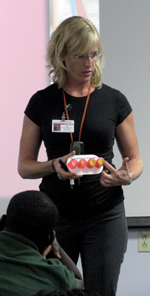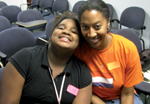|
|
|

|
Battling childhood
obesity
Program targets family change
|
By Dawn Brazell
Public Relations
Janet Carter stands in front of the classroom with a hefty, yellow blob
in her hands.
“This is what five pounds of fat looks like,” she said, letting some of
the children participating in MUSC’s Heart Health program touch it.
“Ewwwww,” exclaims one of the girls, shrinking away from it.
 Janet Carter
teaches young people how diet effects health. Janet Carter
teaches young people how diet effects health.
Carter, a registered dietitian and Heart Health coordinator, points to
one section of the mass and tells them that would be equivalent to
losing a pound. “Even a couple of pounds can make a difference.”
Showing charts of food labels and types of fat, she teaches the young
people more about how to make healthy food choices during the one-hour
group session. They finish with a game where they pretend to be either
HDL cholesterol (high-density lipoproteins) or LDL cholesterol
(low-density lipoproteins) as they battle to either clog or unclog an
artery with sponges that they stick to a carpeted wall. As Carter
increases the number of HDL players, the arteries get less clogged. The
children get to learn the lesson, have fun and break a sweat.
Brooke Ramsey, 16, loves the program. She has lost 15 pounds since
July. “I think it’s great. I was surprised at how quickly I could lose
weight. It’s helping me to make better choices.”
Ramsey got involved with the program because she’s at risk for
developing diabetes. She’s in the marching band at Fort Dorchester High
School and said she already can tell a difference in her stamina.
Knowing what she does now about nutrition has made it easier to
withstand peer pressure about eating the wrong foods.
“It has changed my life.”
 Erica Callaway,
left, and her mother Licia Hendriks enjoy taking the classes together. Erica Callaway,
left, and her mother Licia Hendriks enjoy taking the classes together.
Erica Callaway, 11, agreed. She has been doing the program almost four
years and finds the group sessions help her stay motivated to stick to
healthy lifestyle habits. Her mother, Licia Hendriks, said she enjoys
attending, too, even though they’ve been in the program long enough to
know the information. It helps hearing it again, she said.
Heart Health, which started in 2004, is both the pediatric weight
management program of the MUSC Children’s Hospital and the preventive
cardiology service of the Children’s Heart Center. Participants include
any child or adolescent who has abnormal weight gain or associated
cardiovascular risk factors, such as high cholesterol, high blood
pressure, or pre-diabetes.
The program is medically monitored by Melissa Henshaw, M.D., who also
is conducting a Pediatric Metabolic Syndrome Study of children ages 4
to 21. The study’s goal is to investigate the cluster of cardiovascular
risk factors that many obese children face, including developing
elevated blood sugar, blood pressure and cholesterol levels.
“These risk factors comprise the metabolic syndrome, and its presence
can put individuals at heightened risk for cardiovascular disease. We
need to learn more about the root causes of the metabolic syndrome
through comprehensive research so that we can provide the best tools
possible to help affected families.”
Henshaw said to be able to help obese children the most effectively,
Heart Health focuses on helping the entire family be able to create
change.
“All patients we see face their own obstacles to weight management, and
our job is to seek out and address those obstacles one step at a time,
empowering families to make lifestyle changes that will work for them
and last over time.”
Obesity is a chronic, complex disease process, and there are many
precipitating factors including genetics, but the more the program can
teach families about how to make the best possible nutrition and
activity choices, and how to modify lifestyle behaviors to promote
health, the better off children will be as they enter adulthood and
begin their own families, she said.
She’s very excited to be a partner in the new Southeastern Virtual
Institute for Health Equity and Wellness, under the direction of Sabra
Slaughter, Ph.D. “Our vision in joining SE VIEW is to build upon
existing bonds with school-based outreach programs like the Lean Team,
and create new partnerships with other community-based outreach efforts
like Healthy People in Healthy Communities, to bring even more obese
children into Heart Health.”
Carter’s also excited about that goal. There are about 100 families
participating in Heart Health, but they’d like to be able to reach more
families and establish satellite services.
“We’re really the only clinic-based program that exists in South
Carolina doing this sort of thing,” Carter said.
 Children play a
game to reinforce the heart-healthy principles they just learned. Children play a
game to reinforce the heart-healthy principles they just learned.
What makes it special as a clinical program is that it’s physician
supervised, features educational group sessions on nutrition, and
includes her meeting with the children every two weeks to do
personalized goals and nutritional counseling. The children receive
blood work and clinical measurements, including bodyfat and blood
pressure, and have the option of attending weekly fitness sessions held
at The Citadel.
Carter said one of the program’s main goals is to raise awareness of
the extent of childhood obesity and the array of chronic conditions
that it can cause. “I find a lot of families who come into Heart Health
just don’t realize the extent of the problem. Parents are so used to
seeing large children that they don’t look big anymore. A child will
come in to see me who is obese, and the parent will say, ‘Oh, he just
has a few extra pounds, but he’s not too big.’ They’re just completely
unaware. Raising awareness is crucial.”
Whether it’s children or adults, though, confronting obesity is a
complicated process. Sometimes the children aren’t ready to make the
change, but she knows she’s giving them the tools they can use for when
they decide it’s time to change.
“Heart Health is changing kid’s lives one kid at a time. It’s just
doing what we can, small step by small step. We’re affecting their
health for years to come. I know it’s making a huge difference.”
How You Can Help
A heart healthy fundraiser meal will be held at 7 p.m., Oct. 14 at
McCrady’s Restaurant. Tickets are $40.
The Pediatric Metabolic Syndrome Study offers obese children and
adolescents free evaluations that include nutrition assessments,
fasting labs, body composition scans, and echocardiograms.
Call 792-4717, e-mail catjan@musc.edu, or visit http://www.musckids.com/heart/health/.
Friday, Oct. 8, 2010
|
|
|





